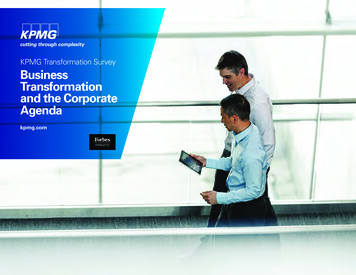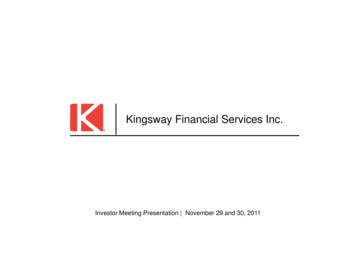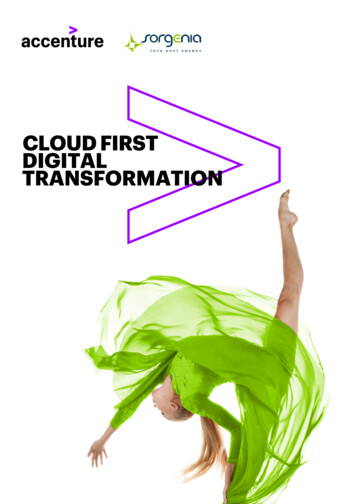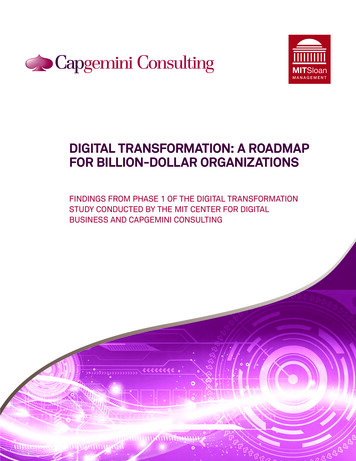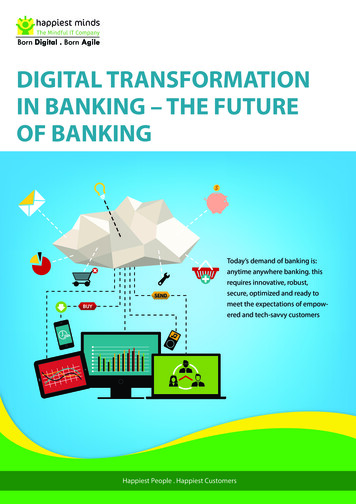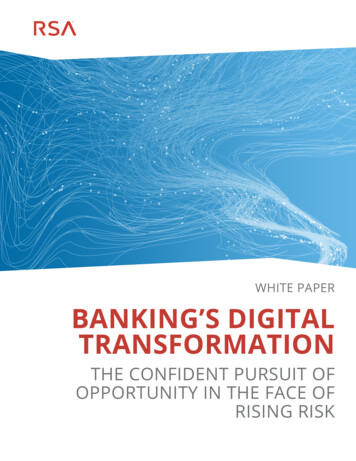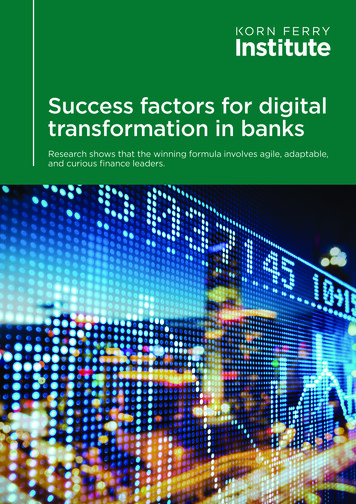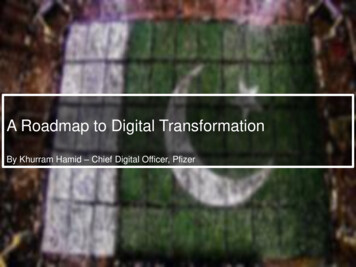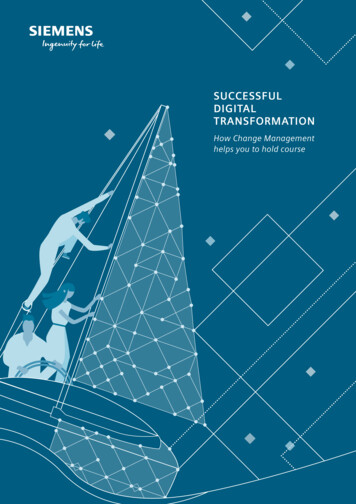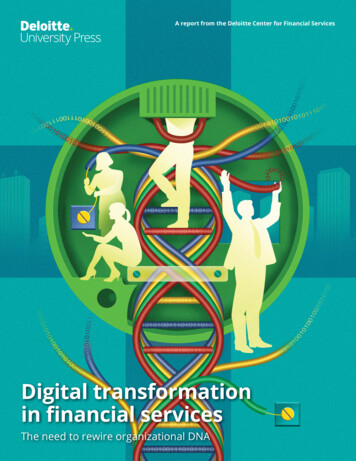
Transcription
A report from the Deloitte Center for Financial ServicesDigital transformationin financial servicesThe need to rewire organizational DNA
Deloitte Digital is a digital consulting agency that brings together all the creative and technologycapabilities, business acumen, and industry insight needed to help transform our clients’ businesses. Learn more at www.deloittedigital.com.
The need to rewire organizational DNACONTENTSIntroduction 2What about the employee experience? 3Digital DNA attributes better prepare FSI firms for adigital disruption 6Current strength of Digital DNA attributes among FSIfirms 12Where do you start the rewiring? 19Appendix: Case studies on rewiring Digital DNAattributes 21About the research 24Endnotes 251
Digital transformation in financial servicesIntroductionIn the quest to achieve market leadership, financial services industry (FSI) firmscontinue to focus on becoming holistically digital, customer-facing enterprises.But are they there yet? The 2016 Digital Business Global Executive Study andResearch Project (“the survey”), the fifth annual study conducted by MIT SloanManagement Review and Deloitte Digital on this topic, offers some revealinginsights and their implications.The survey showed that overall, the financial servicesindustry is on the cusp of a digital transformationright now. FSI firms are making significantinvestments to enhance customer experience andengagement through the development of new digitalproducts and capabilities. The survey revealed thatof the FSI firms with a digital strategy, 93 percentagree or strongly agree that the objective of theirdigital strategy is to improve customer experienceand engagement.of the financial institution employees surveyed donot believe their firms are ready for this disruption.Only 46 percent of FSI respondents agree or stronglyagree that their firms are adequately preparing fordigital disruption, marginally better than the 44percent last year.1 So what’s holding FSI firms backfrom fully embracing the digital world and all thatbecoming digital entails?To help answer this question as completely aspossible, in addition to our research findings andanalysis, we have also included industry-specificcase studies, along with cross-industry case studies,of digital transformation in action. The crossindustry examples—GE, CBRE, Whirlpool, andAmazon—can be found in the Appendix.Throughout the industry, there is widespreaddigital disruption. A full 90 percent of respondentsagreed or strongly agreed that digital technologiesare disrupting the industry to a great or moderateextent. Yet the study also showed that a majority2
The need to rewire organizational DNAWhat about the employeeexperience?IT appears that as a whole, the industry has notfully explored what it means to be digital, from theinside out. Many FSI firms, focused primarily onleveraging digital capabilities to become customerexperience champions, have not devoted enough attention to the other side of the coin: the employeeexperience. For the purposes of this report, the term“employee experience” is defined as how employees feel about their organizations with regard toboth opportunities for growth/skills development,and employees’ willingness to continue to work fortheir current firms. The following survey findingsreveal that employee experience remains a blindspot in FSI firms’ digital efforts (see figure 1): A full 76 percent of the survey respondents consider it very important or extremely importantto work for an organization that is digitally enabled or is a digital leader. Only 38 percent of FSI respondents agree orstrongly agree that their organization offersemployees the resources or skill-developmentopportunities they would need to thrive in adigital environment.successfully aligns its culture—a system of values,beliefs, and behaviors that shapes “how work getsdone”—with the business, operating, and customermodels found in digital enterprises. This is largelybecause, in a dynamic digital environment, thelegacy approaches involving a firm’s adaptability tochange, work style, leadership style, decision making, or for that matter, risk appetite, may not be effective. Nearly half—41 percent of survey respondents—plan to stay at their current organizations forthree or fewer years.A blending of focus on customer experience andemployee experience is key to better preparing FSIfirms for a digital future. In a recent interview, Donna Morris, executive vice president of customer andemployee experience at Adobe Systems, explained,“By combining employee and customer experiences, we are able to create rich customer experiencesthrough high levels of employee engagement.”2Research suggests that culture gets hard-wired overtime and is difficult to change.3 According to MaileCarnegie, group executive, digital banking at ANZBanking Group Limited, “[Culture is] the hardestthing to get right, but it’s also got the highest lever-But how can FSI firms improve the employee experience? This can happen when an organization3
Digital transformation in financial servicesage. The highest return on investment is gettingthat culture right.”4Many financial institutions have failed to recognizethat digital business is fundamentally different inmany ways, and that simply doing the digital thingsdescribed above will not suddenly make them digital. In other words, while many FSI firms have leveraged digital technologies to extend their productand delivery capabilities, they have not yet rewiredtheir organizations’ business, operating, and customer models to actually being digital. We explorethis purposeful reorientation of Digital DNA attributes in greater detail in the following sections.So, which behaviors should FSI firms demonstrateand where should they start? It should be pointedout that while Deloitte has a very comprehensiveand robust approach to organizational culture,this report will focus on a highly specific subsetof culture—Digital DNA. Deloitte’s Digital DNAframework outlines the traits and characteristics of“being” digital, and what it takes for businesses tothrive in a digital world.Figure 1. Marrying the customer and employee experience is instrumental in firms’preparedness for digital disruption90%90% of respondents agreeor strongly agree thatdigital technologies aredisrupting the industry toa great or moderate extent93%AND46%93% of those with a digitalstrategy agree or stronglyagree that the objective oftheir digital strategy is toenhance customerexperience and engagementYETOnly 46% agree or stronglyagree that they areadequately preparing fordigital disruptionLow preparedness could likely be attributed to limited focus on employee experience76%38%41%Consider it very important or extremely important to work for anorganization that is digitally enabled or a digital leaderAgree or strongly agree that their firms actually provide resources andopportunities to develop skills to thrive in a digital environmentExpect to work at their current organizations for no more than three yearsA focus on aligning culture to a digital enterprise can drive better preparedness fordigital disruption64%Of the respondents who said that their organizations are moving toward a culturethat is collaborative, agile, and bold, believe their firm is preparing for digitaldisruption.Source: 2016 MIT Sloan Management Review; Deloitte Digital’s global study and Deloitte Center for Financial Services analysis.Deloitte University Press dupress.deloitte.com4
The need to rewire organizational DNADEMYSTIFYING DIGITAL DNABeing digital is significantly different from the traditional way of doing things in FSI firms. As our survey suggests, FSIfirms’ legacy cultural attributes include a protracted response to change, siloed work style, hierarchical organizationalstructure, and a cautious, regulation-determined risk appetite, among other behaviors (figure 2).On the other hand, Digital DNA behaviors create the environment that enables firms to do business digitally. Wehave grouped Deloitte’s Digital DNA framework’s characteristics into five categories for purposes of our study: agility,collaboration, distributed organizational structure, bold risk appetite, and customer centricity.Figure 2. FSI legacy and Digital DNA attributesCulture attributesLegacy DNADigital DNAAdaptabilityto changeSlow, but innovating Resistance to fail Focus on innovation Late adopters of technology changeAgility Iterative Constant disruption Continuously innovating Fail early, fail fast, learn faster Fluidity Uneven velocity between digital and businesses Changing nature and topology of work Continuous ecosystem disruptionWork styleSiloed Fixed team structures Siloed operations Well-defined roles and skill requirements Geography dependentCollaboration Morphing team structure Democratizing information Dynamic skill requirement Intentionally collaborative Geography agnosticOrganizationalstructureHierarchical Long-standing levels of hierarchy Decision making driven by positional authority,and not skills and proficiencyDistributed Flattening and changing hierarchy Ongoing shifts in decision rights and power Changing mix of traditional and nontraditionalstakeholdersRisk appetiteCautious Regulatory-determined risk appetite Siloed operations separating more risky andless risky businessesExploratory Modulating risk and security boundariesCustomer experienceCustomer focus Use of analytics to anticipate customer needs Focus on the feedback loop to hear customervoices Latency in customer feedback and firms’responseCustomer centricity Real time and on demand Increased customer involvementSource: Deloitte Digital and Deloitte Center for Financial Services analysis.Deloitte University Press dupress.deloitte.comAs figure 2 shows, there may be some extent of commonality between the legacy DNA and Digital DNA attributes.Customer experience is a good example, where FSI firms have been doing digital and investing in new products andcapabilities. That said, many FSI firms have the scope to improve real-time collection of customer data and providemore relevant on-demand experiences. Given the fact that FSI firms already recognize the importance of using digitaltechnologies and are taking proactive steps to enhance customer experience, we have kept customer experience out ofthe purview of discussion in this report.In contrast, there are some Digital DNA attributes that are potentially in conflict with the legacy way of doing things—for example, risk appetite. Here, it’s essential to strike a balance, which could allow firms to remain cautious whenengaging in high-risk activities, but lend a freer hand and become more exploratory when handling less-risky ones.Banks opening up their APIs to allow technology firms to build applications for their customers could be viewed as onesuch exploratory move.55
Digital transformation in financial servicesDigital DNA attributesbetter prepare FSI firmsfor a digital disruptionS3, only 19 percent of respondents believe theirorganizations are nimble. Of these, 71 percentagree or strongly agree that their organization isadequately preparing for digital disruption, ascompared to only 34 percent of those consideringtheir firms to be slow/deliberative. Moreover, 68percent of respondents who said their firms arenimble are willing to work at their organizations formore than three years, compared to 41 percent ofrespondents who perceived their firms to be slow.O, if FSI companies recognize the importanceof using digital technologies to enhancecustomer experience, how can they use thenotion of Digital DNA to help them better preparefor digital disruption? For purposes of this report,we have delved deeper into attributes of DigitalDNA that can help FSI firms improve the employeeexperience. We also assess the positive correlationbetween companies’ Digital DNA attribute strengthand employees’ willingness to work in suchcompanies for a longer tenure.To embed agility into organizations, FSI firm leadersshould exhibit the following characteristics:But what do these Digital DNA attributes entail?Let’s understand them in some detail. Iterative: Update and improve based on rapidand ongoing feedback and analytics insights.Agility Fail early, fail fast, learn faster: Allow customers to test pilots of products and services intheir minimum viable state. This process enablescompanies to learn from failures and provide abetter offering vs. having an intermittent failureimpede progress.Agility refers to a firm’s ability to move rapidlyand flexibly in order to make adjustments in acontinuously disruptive ecosystem. In fact, theconstant disruption and innovation in digitalbusinesses tend to result in new models of what thework is and how work gets done. Job descriptions,tasks, skills, and requirements also tend to be highlyfluid. Indeed, traditional FSI firms may move sloweras compared to a digital enterprise and the unevenvelocity between the legacy and digital businessis likely to create friction between the legacy anddigital operating models. According to the survey,lack of organizational agility is one of the biggestbarriers impeding firms from taking advantage ofdigital trends. Fluidity: Enhance ease of movement of talentand resources from one situation or solution tothe next and possibly back again, while shiftingoperating models and offering frequent updatesand communications. Continuously innovating: Promote continuous innovation by questioning and acting onhow or why things are done the way they are, andwhy they couldn’t be done differently. This is important because the digital ecosystem is broad,boundaryless, and dynamic, and new ideas andtheir different applications are constantly (andat an increased speed) being developed.FSI firms should recognize and develop an approachto minimize the impact of the differences betweenthe two operating models. As highlighted in figure6
The need to rewire organizat
industry is on the cusp of a digital transformation right now. FSI firms are making significant investments to enhance customer experience and engagement through the development of new digital products and capabilities. The survey revealed that of the FSI firms with a digital strategy, 93 percent agree or strongly agree that the objective of their digital strategy is to improve customer .
